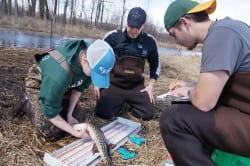Associate Prof. Patrick Forsythe (Biology) teamed-up with researchers from the University of Wollongong (School of Earth, Atmospheric and Life Sciences) in Australia to better understand the reproductive behavior of male and female red-backed toadlets. The research was published in the most recent issue of Behaviour. The site includes the abstract. The relative influence of climatic and

social factors on sex-specific variation in reproductive behavior remains poorly understood. Here, we examine the influence of multiple climatic cues in combination with a social cue on the reproductive behaviors of males and females in a terrestrial breeding toadlet (Pseudophryne coriacea). Over a 115-day breeding season, arrival patterns of each sex, and male calling activity, were recorded daily, while climatic variables were logged continuously. Multivariate analysis showed that arrival of males at the breeding site, as well as male nightly calling activity, were most strongly influenced by a climatic variable (rainfall). By contrast, female arrival was strongly correlated with a social variable (male calling activity), with abiotic conditions having no influence, other than a moderate influence of lunar phase (lunar illumination). These results suggest that cues used for breeding are sex-specific and provide new evidence that combinations of climatic and social cues can be integrated into breeding decisions.

